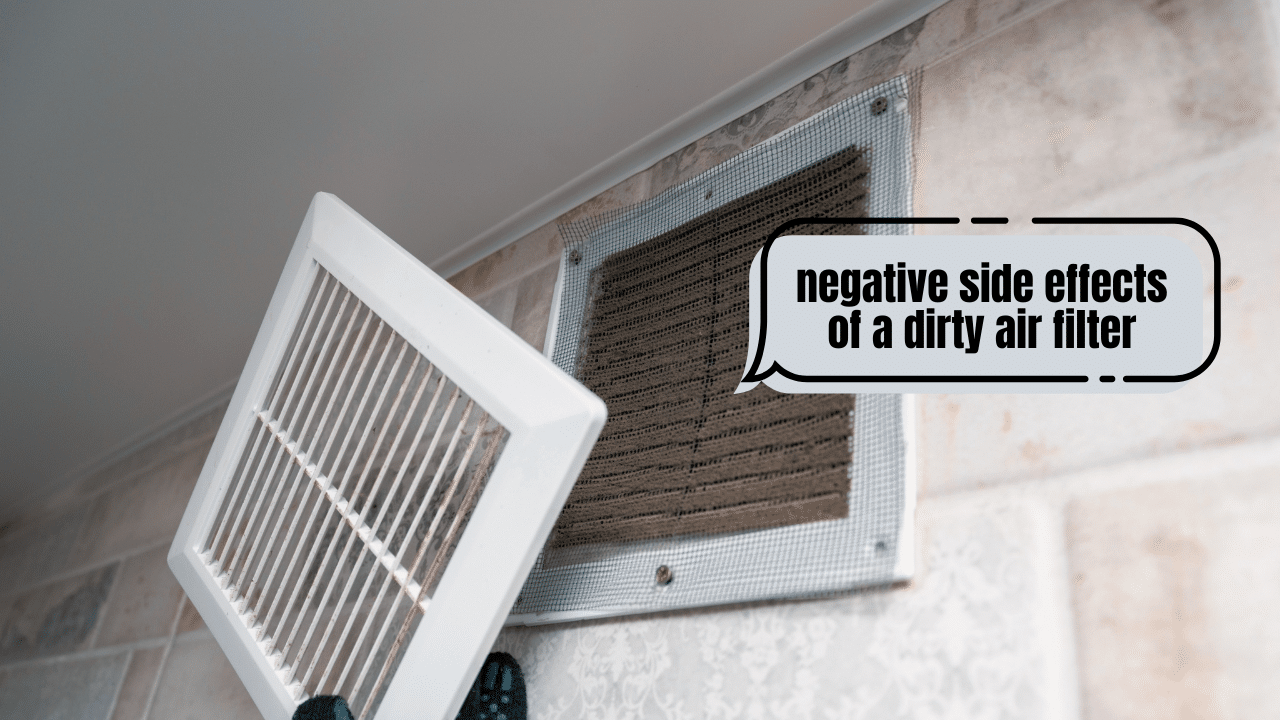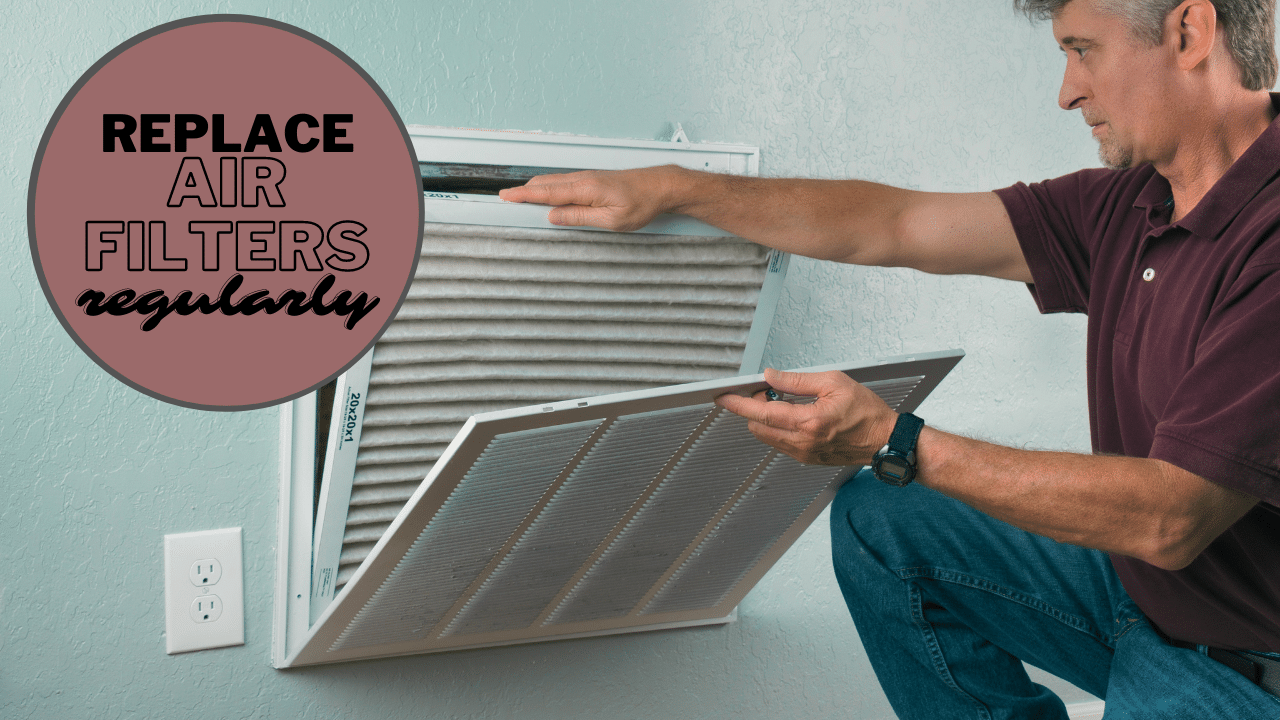If you have been sneezing or coughing for days or generally not feeling well– there are plenty of reasons. You may have caught the flu or triggered your allergies… But, did you know a filthy air filter might also cause this irritation?
This doesn’t mean you need to sound the alarm at this point. But as the adage goes, prevention is better than cure.
The good news is— it is relatively simple to change your home’s air filter. It only takes 5 minutes of your time, so there’s no reason for you to keep delaying this task for months. Having a clean air filter helps ensure optimal performance of your home’s heating and cooling system, energy efficiency, and clean breathing air.
The Dangers of Having Dirty Air Filters at Home
Many homeowners fail to understand how crucial it is to regularly change dirty, old air filters. When overlooked, things may just get out of control and cause more trouble for you in the long run.

Let’s discuss the damage of dirty, clogged air filters and how they may damage or inconvenience your everyday living. We’re talking about potential home damage, wallet woes, and even possible health issues.
Constantly Increasing Electricity Bills
Dirty, old filters will push your AC unit to use more electricity. Your central air conditioner system relies on the consistent recirculation of air.
If that airflow is clogged or obstructed by dirt or debris, the system will have to work harder just to cool your home adequately. The harder the system needs to work to pull air around the home, the more energy it will consume. This will eventually be reflected in your drastically high utility bills.
As the air filter becomes more clogged, the more it’ll cost you in the long run.
Frozen Evaporator Coils
If you have a clogged air filter in the summer cooling season, this may lack proper airflow to the cooling coils or evaporator. This may cause condensation, which is usually produced in the cooling process.
The frost may build up on the coils and fans, making it difficult for the air conditioner to remove heat from the air and provide sufficient cooling to your home. Ultimately, it may result in more issues and a financial disaster if your AC unit decides to break down.
Possible Growth of Mold, Mildew, and Bacteria
A clogged air filter may also be why the evaporator coil is caked with bacteria, dirt, or mold. This will affect the critical heat exchange process, making the AC system unable to make the indoor climate as comfortable as possible.
Think of your evaporator coil as a petri dish — as it serves as the perfect breeding place for harmful microorganisms to thrive.
Reduces the Airflow & Adds more Strain on Your Blower Fan
Blower fans are the ones responsible for pushing the air through a filter. Once the air filter becomes clogged with dander and dust, the blower will need to work harder just to let the air pass through.
As mentioned in the other pointers, the increased strain will raise your average energy use. This translates to a higher electricity bill. Other than that, you will also experience inconsistencies in your room temperature. The blower fan may also give up and burn out at some point, which leads to overheating issues and total system collapse.
Lowered Air Quality in Your Home
If the air filter is filthy, there’s a great chance that the indoor air you breathe is dirty. Keep in mind that the filter is designed to eliminate all microscopic particles— such as bacteria, dust, pollen, and mold spores.
A blocked filter will only recirculate these harmful particles inside your room, which may result in chronic allergies, cold-like symptoms, and fatigue. Homeowners with furry pets may even have decreased indoor air quality if their air filters remain clogged and dirty for a long time. (Related: A Comprehensive Guide To Household Indoor Air Quality)
Possible System Failure
The unnecessary strain on your HVAC unit may cause the entire system to stop working altogether. It may cost you thousands of dollars for the necessary repair or parts replacement. On the contrary, spending no more than $10 on changing your dirty air filter doesn’t seem bad if you look at the big picture.
The Importance of Clean Air Filters at Home
With all things considered, a dirty air filter doesn't only cause you to feel under the weather and deal with flu-like symptoms that never seem to go away. It may also lead to the system's inefficiency and total breakdown.

Remember that all air passing through the HVAC system needs to go through the filter. And if this is filthy and full of dust and dander, the airflow will be restricted. Your home's heating and cooling system will need to work harder, resulting in premature wear and tear, total breakdown, and monthly high utility bills.
As soon as you notice a dirty air filter's telling signs and symptoms, it would be best to act on it at once. The task of replacing it with a clean one is relatively quick and easy, not to mention— inexpensive. If you keep your filter correctly cleaned and maintained, you'll extend the average lifespan of your residential HVAC system and avoid dealing with pressing, expensive issues.
Preventative Maintenance is Crucial
Aside from changing your filter regularly, you’ll need to follow annual tune-up appointments with a local professional to ensure your heating and cooling systems are at their prime. Some companies offer plans at a low monthly cost— so you won’t need to spend a fortune to ensure your filters are clean and polished.
Investing in the help of a skilled, experienced professional will help ensure your HVAC systems are in tip-top shape all year round.
Frequently Asked Questions (FAQs)
What are the dangers of a dirty air filter?
A dirty air filter can also cause the formation of mold spores. Mold may cause various major health problems for your household, including worsening respiratory conditions (asthma), headaches, exhaustion, and skin irritation.
Can I let my AC unit run without a filter?
Never turn on your air conditioner without a filter installed. Without that filter, dust and debris would accumulate on internal components, causing future maintenance problems. This isn't usually a problem with disposable filters, but make sure to purchase a replacement before removing the old one. Cleaning your reusable filter should be done when the air conditioner isn't needed, such as on a cool night.
How often should I change my filter to prevent these symptoms?
To determine how often to change your filter and which MERV rating is recommended for best air cleaning and system performance, see the owner's handbook that came with your heating system. If your owner's handbook doesn't mention the air filter, or if you can't find it, it's typically advised that you change it once a month during peak heating and cooling seasons. If you have pets or smokers in your house, you may need to change the filter more frequently to avoid indoor air quality problems.
Are the benefits of air filters significant enough to outweigh the costs?
Yes, the benefits outweigh the disadvantages. An air purifier is an excellent investment if you compare it to the medical bills you may otherwise expect. If you have a household with numerous people who may experience breathing problems due to a dirty air filter, replacing it every few months may be less expensive than having multiple individuals visit the doctor at the same time.
How can I determine the efficacy of a particular model of filter?
The minimum efficiency reporting value (MERV rating) ranges from 1 to 20. The higher the rating, the more air particles the air filter can filter. However, certified HEPA filters are rated between 17 and 20. (Related: MERV 16 Filters: How Well Do They Keep Viruses and Pollutants Out of Your Home’s Air)
